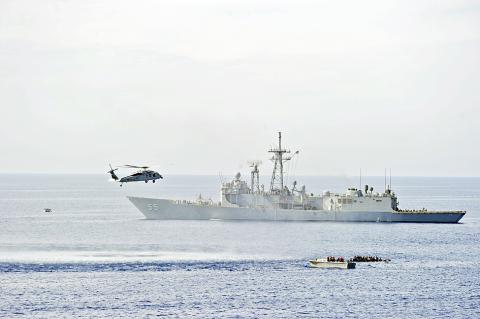Taiwan is grateful to the US for agreeing to sell four Perry-class guided missile frigates, the Ministry of National Defense (MND) said yesterday, adding that they would enhance the nation’s defense capabilities and contribute to peace and stability in the region.
China reacted by lodging a formal complaint with the US and calling for an end to arms sales to Taiwan.
US President Barack Obama on Thursday signed into law a bill that authorizes the sale of up to four Perry-class frigates to Taiwan. The US Senate and House of Representatives had both passed the bill earlier this month.

Photo: EPA
The sale of the frigates demonstrates the Obama administration and US Congress’ commitment to the Taiwan Relations Act and support for Taiwan’s security, while also attesting to the mutual friendship and strengthening of bilateral ties between Taipei and Washington, ministry spokesperson Major General David Lo (羅紹和) said.
The government has budgeted about NT$5.5 billion (US$174.8 million) to purchase two Perry-class frigates, Lo said, adding: “The navy will review its needs and decide whether to buy more frigates in the future.”
“The purchase program will follow the military’s arms procurement regulations. We shall be in close contact with our US counterparts to obtain the frigates’ shipboard architecture and weapons systems that are suited to our combat needs,” Lo said.
He added that the sale “will boost our military’s confidence and capability to defend the nation, and help maintain peace and stability in the region.”
The navy will send a team to the US next year in preparation for taking delivery of the frigates, which are expected to arrive in 2016 at the earliest.
The measure approved by the US government will allow the sale of four Perry-class frigates — the USS Gary, USS Carr, USS Taylor and USS Elrod — to Taiwan.
Ministry officials said they would replace the nation’s aging fleet of Knox-class vessels, which have been in service for about 50 years.
The 4,165-tonne Perry-class frigates are designed for marine-patrol warfare, with secondary anti-
aircraft and anti-ship capability.
US Representative Ed Royce, chairman of the US House of Representatives Committee on Foreign Affairs, said the arms sales would bolster Taiwan’s maritime security and its critical relationship with the US, as provided for in the Taiwan Relations Act of 1979.
“Few other pieces of foreign policy legislation have been as consequential as this act. With steadfast support from the United States Congress, Taiwan has become a thriving modern society that strongly respects human rights, the rule of law and free markets,” Royce said.
The US measure drew an angry reaction from Beijing, with Chinese Ministry of Foreign Affairs spokesman Qing Gang (秦剛) saying: “China is strongly dissatisfied” with the bill.
“We are firmly opposed to arms sales to Taiwan by the US,” he added, reiterating Beijing’s longstanding position.
“We have launched solemn representations with the US side,” he said, using formal language for a diplomatic protest, adding that Taiwan “remains the most sensitive issue in China-US relations.”
He also called on the US to cut official and military exchanges with Taiwan.
Additional reporting by AFP

CHAOS: Iranians took to the streets playing celebratory music after reports of Khamenei’s death on Saturday, while mourners also gathered in Tehran yesterday Iranian Supreme Leader Ayatollah Ali Khamenei was killed in a major attack on Iran launched by Israel and the US, throwing the future of the Islamic republic into doubt and raising the risk of regional instability. Iranian state television and the state-run IRNA news agency announced the 86-year-old’s death early yesterday. US President Donald Trump said it gave Iranians their “greatest chance” to “take back” their country. The announcements came after a joint US and Israeli aerial bombardment that targeted Iranian military and governmental sites. Trump said the “heavy and pinpoint bombing” would continue through the week or as long

TRUST: The KMT said it respected the US’ timing and considerations, and hoped it would continue to honor its commitments to helping Taiwan bolster its defenses and deterrence US President Donald Trump is delaying a multibillion-dollar arms sale to Taiwan to ensure his visit to Beijing is successful, a New York Times report said. The weapons sales package has stalled in the US Department of State, the report said, citing US officials it did not identify. The White House has told agencies not to push forward ahead of Trump’s meeting with Chinese President Xi Jinping (習近平), it said. The two last month held a phone call to discuss trade and geopolitical flashpoints ahead of the summit. Xi raised the Taiwan issue and urged the US to handle arms sales to

State-run CPC Corp, Taiwan (CPC, 台灣中油) yesterday said that it had confirmed on Saturday night with its liquefied natural gas (LNG) and crude oil suppliers that shipments are proceeding as scheduled and that domestic supplies remain unaffected. The CPC yesterday announced the gasoline and diesel prices will rise by NT$0.2 and NT$0.4 per liter, respectively, starting Monday, citing Middle East tensions and blizzards in the eastern United States. CPC also iterated it has been reducing the proportion of crude oil imports from the Middle East and diversifying its supply sources in the past few years in response to geopolitical risks, expanding

Pro-democracy media tycoon Jimmy Lai’s (黎智英) fraud conviction and prison sentence were yesterday overturned by a Hong Kong court, in a surprise legal decision that comes soon after Lai was jailed for 20 years on a separate national security charge. Judges Jeremy Poon (潘兆初), Anthea Pang (彭寶琴) and Derek Pang (彭偉昌) said in the judgement that they allowed the appeal from Lai, and another defendant in the case, to proceed, as a lower court judge had “erred.” “The Court of Appeal gave them leave to appeal against their conviction, allowed their appeals, quashed the convictions and set aside the sentences,” the judges